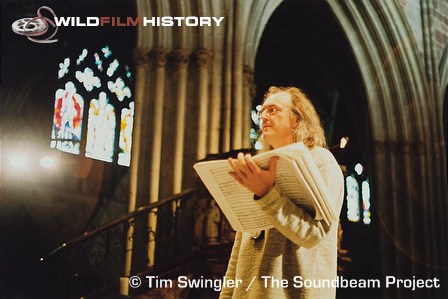Martin Kiszko

Composer, conductor and musician, Martin Kiszko first became interested in natural history and music from a very young age. His father, a Polish musician, was keen to instil a love of music and nature in his son and often took him on wild walks in the Yorkshire countryside, carving Lithuanian whistles for him as they explored.
By the age of 10 Martin had enrolled at Leeds Music College where he studied music theory and was classically trained to play the saxophone, clarinet and keyboard, before moving on to study music and fine art at Bretton Hall College, and then a postgraduate film and television course at Bristol University.
In 1979, Martin met composer Edward Williams who was working on the musical score for the wildlife series Life on Earth. Martin assisted Edward and learnt how to track lay and mix music for the series. Later, they worked together on Discovery of Animal Behaviour and The Living Isles and also co-founded an inter-media performance group, Uncle Jambo’s Pendular Vibrations (later Elektrodome), who performed Martin’s work Cairoglyph and The Stratagem of Nauplius.
In 1983, Martin completed his first solo film score for Forest in the Sea. By 1986 he had composed for a symphony orchestra and began working with conductor Harry Rabinowitz. Together, they worked on an eight part series that explored early North America, entitled Land of the Eagle. In order to create a score with ethnic integrity, Martin researched Native American music, songs and instruments, such as the Navajo flute. He also used a symphony orchestra to create a melodic, expansive score that matched the landscape.
Martin carried on this ethnomusicological research to his next film Shadow of the Hare using baroque flutes and hurdy-gurdies to complement the themes of folk mythology. In the award winning Realms of the Russian Bear he used over 65 Russian instruments in the final score including the Bayan accordion, the balalaika, and the domra as well as a Russian vocal group. Subsequent to this, he pioneered the use of Eastern European orchestras in natural history series Alien Empire and Battle of the Sexes.
Martin’s diverse skills have enabled him to compose orchestral scores not only for natural history documentaries, but also network dramas and feature films. In 2004, he was awarded the Composer of the Year Award by The British Academy of Composers and Songwriters. As well as continuing to compose orchestral scores, Martin delivers lectures and workshops in universities and festivals, and has also written and directed a teaching guide to the composition of music entitled The Art of the Film Score.






